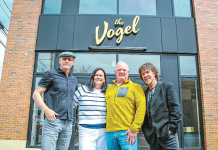
Photo courtesy Monmouth County
By Philip Sean Curran
Veterans living in Monmouth County are getting help closer to home, thanks to an arrangement between the Veterans Affairs (VA) and county government.
Beginning this spring, a VA employee was assigned to work at the county’s division of aging, disabilities and veterans services located in Freehold. Wanda Richards-Clarke, a vocational rehabilitation counselor, helps disabled vets of all ages find work and obtain other services that they’re entitled to.
“I enjoy what I do and I’m looking forward to having collaboration with the county and the human services so we can get the veterans all the services they deserve,” she said Sept. 6 at an event in Freehold to welcome the VA to the county.
Veterans whom she helps range from those in their early 20s to their 80s. With the nation having been at war since 2001, many veterans have had to make the transition back to civilian life. “And a lot of times, they’re not prepared for what they face on this side,” she said. “So we’re there to kind of help them and make that transition a little bit easier.”
Michael Ruane, 77, a former county employee from Wall, spoke at the event of the challenges he experienced returning from his 12-month tour in Vietnam, where he commanded two infantry companies. Toward the end of June 1967, he was told he could go back home.
“Two days later, I was in New Jersey, no decompression, different from World War II, different from Korea,” said the decorated combat veteran.
For years, he did not sleep well and would wake up in the middle of the night calling for artillery, he said.
In later years, he would seek help from the VA and said he has seen improvements at the federal agency.
“We are so happy, the veterans I know in this area,… that the VA has changed its mentality and its culture,” he said. “And it’s really helped us an awful lot.” As part of its work, the VA will look at a veteran’s service-related condition and determine what career he or she could enter that would not make those conditions worse, Richards-Clarke said. Those could run the gamut from physical ailments to mental conditions, like post-traumatic stress disorder.
“So we look at all those different nuances of a job, what they would have to do and how it would affect their medical condition,” she said.
Any given month approximately 25 new cases of veterans could come through the door looking for help, in addition to the 70 veterans she is working with already.
Freeholder Lillian G. Burry, the board’s liaison to the division of aging, disabilities and veterans services, said in her remarks how the nation’s veterans have “sacrificed so much.”
“Now these veterans are in need of help, our help,” she said. “We must support our troops who face combat in foreign lands. But we must also help provide for their needs when they return.”
She called it “invaluable” to have Richards-Clarke, a Brooklyn native now living in Monmouth County, working in the county office. Veterans can meet face to face with a VA representative without having to travel outside of Monmouth. In addition, they can have seamless access to benefits and services the county can help them obtain, like Meals on Wheels, for example.
Back in 2010, Monmouth County started a veterans services office. At the time, the county had the third largest number of veterans in New Jersey. As of 2015, there were 28,503 of them in Monmouth, a total projected to decrease in coming years, according to VA data.
“The fact that we now have a vocational rehab specialist in our office is a complement to the range of services we can offer to our veterans,” said Debbie Bottomley, director of disabilities and veterans services at the county.
The county also looks to aid veterans in other ways. The prosecutor’s office runs a diversion program for veterans charged with low-level crimes, said county prosecutor Christopher J. Gramiccioni, a commissioned officer in the U.S. Navy Reserve.
“If there’s a nexus or a reason to believe that they committed those crimes as some kind of result, some kind of trauma they experienced while serving in the military, for example maybe related to PTSD symptoms, we treat them differently,” he said. “And in some cases, what we’ll do is we will ‘stick-and-carrot’ the charges. We’ll say, ‘Look we will treat these charges differently, maybe downgrade them or even dismiss them. But in return for that, you have to agree to get necessary treatment counseling services or otherwise that you need.’ ”
“When we help a veteran, we’re not only helping the individual and their family, but we’re helping an entire community,” Burry said. “It is the right thing to do.”














